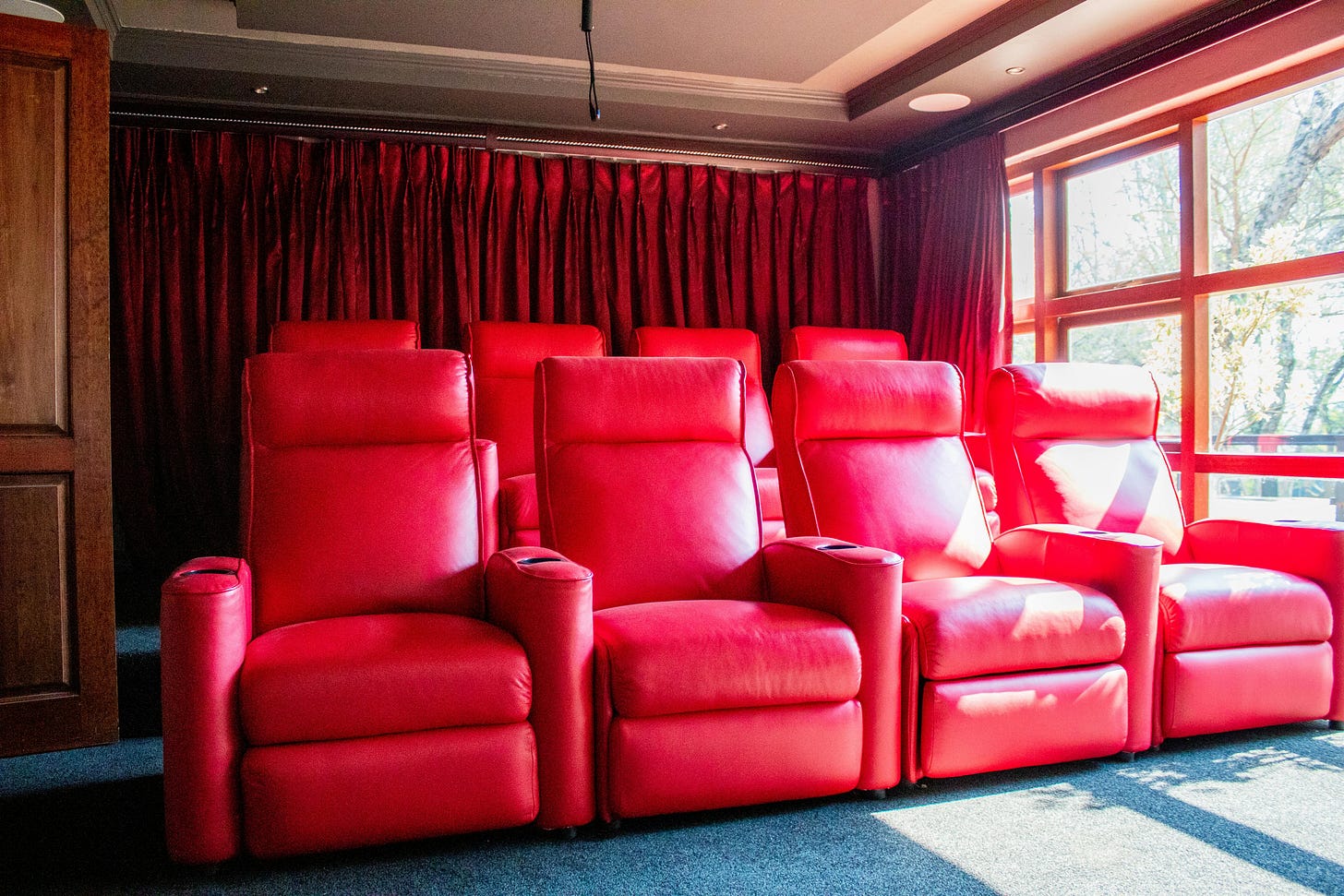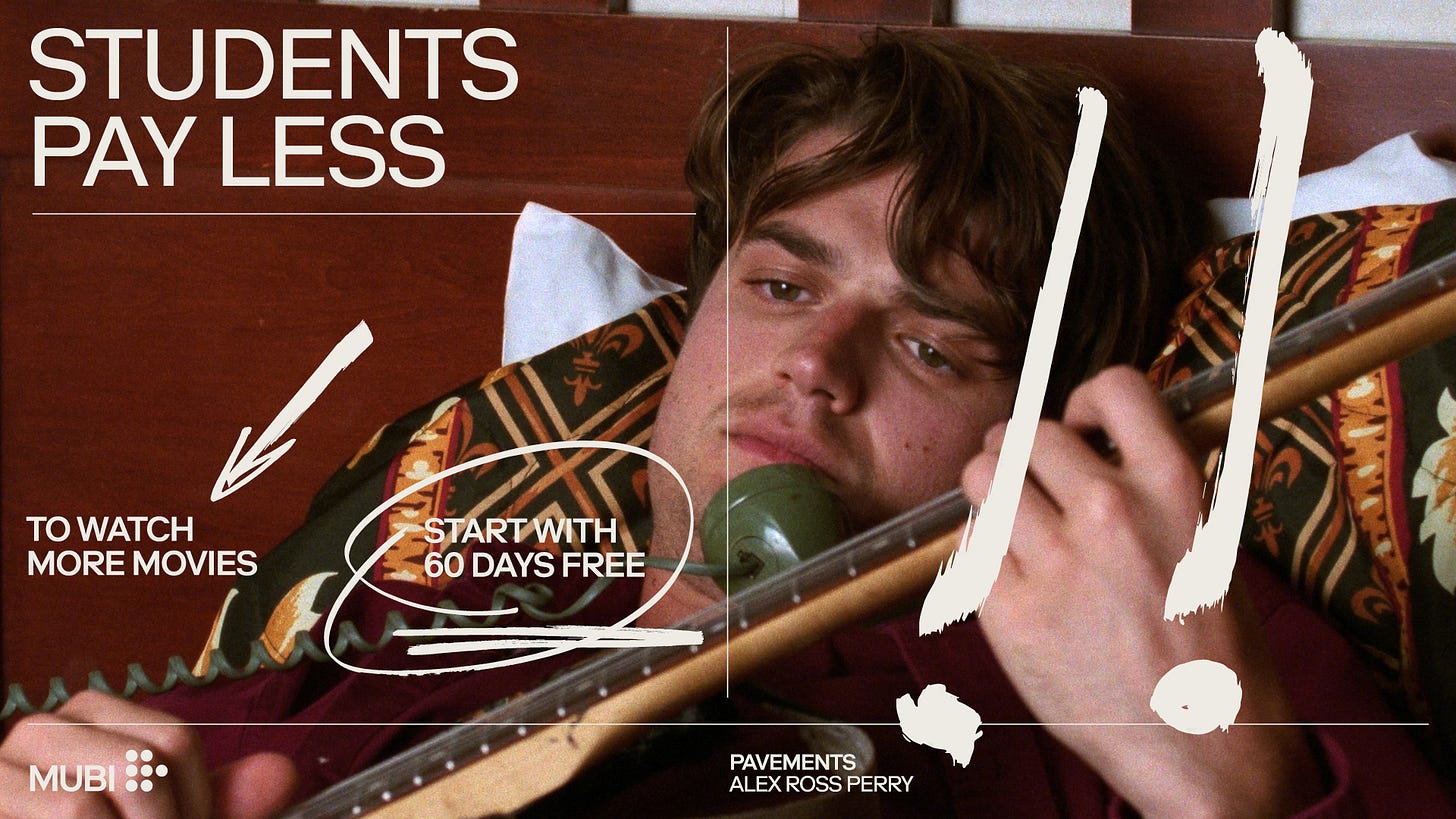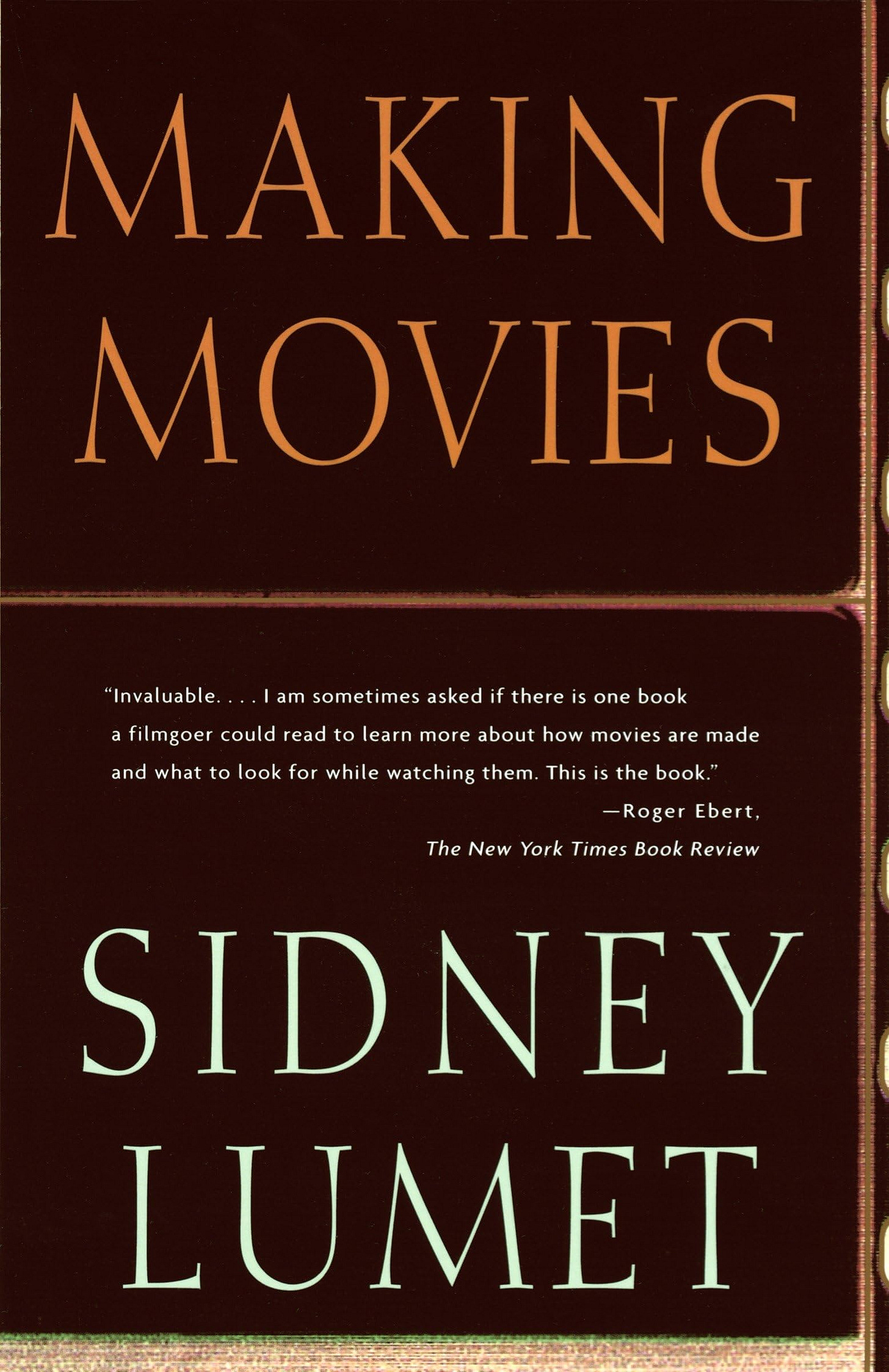10 essentials I wish I had in my DIY film education (MUBI = #1)
Filmstack, we've arrived.
🫶🏻 This post is sponsored by MUBI (the good kind of sponsored):
They reached out, I freaked out, and now students get 60 days free. Win-win!
When people ask me how I became a film writer without formal training, I usually mumble something about "watching a lot of movies" while mentally scrolling through the thousands of hours I spent huddled in front of screens, frantically scribbling notes about camera movements I couldn't name but instinctively understood.
My film education happened in midnight screenings at independent theaters (shoutout to Cine Αμαρυλλίς), on cracked laptop screens streaming questionable Limewire torrents, through dog-eared film books borrowed from libraries, and in endless conversations with friends who'd roll their eyes when I'd say "wait, but did you notice how that final scene mirrored the opening?" for the fifteenth time that evening.
What I never mention is how many dead ends I hit—the weeks lost to algorithm-fed Netflix recommendations showing me variations of the same five films, the money wasted on blind-buy DVDs that ended up collecting dust, the frustration of knowing certain foundational films existed but having no reliable way to access them.
The dark secret of my DIY film school is sheer, maddening inefficiency.
I occasionally daydream about a parallel universe where baby Sophie had access to a proper cinematic compass – some mystical device guiding me through film movements, connecting dots between directors, illuminating pathways across decades and continents without the pitfalls of algorithmic hellscapes or the bankruptcy of buying every Criterion release.
Thankfully, that compass now exists. And it’s called MUBI.
So when their team popped into my inbox about a potential partnership, my enthusiasm required zero manufacturing. Unlike the content vortex of larger streaming platforms, MUBI offers something radical: film school directly to your eyeballs.
And while I'm not suggesting you skip class (please don't tell your professors I said that), I've partnered with them to bring all students everywhere 60 days free, then a rate of $9.99 (£7.99) monthly instead of the standard $14.99 (£11.99). Bargain!
You’ll also want to take advantage of this offer if:
You are an educator wanting your students to actually watch the films they write about instead of skimming ChatGPT summaries.
You are a parent wondering what to gift your child who keeps dropping basic movie takes at family dinners.
Or you're just someone who recognizes that a friend's casual interest in movies could bloom into full-blown cinephilia with the right push.
Share this offer with them, they’ll love you for it 🫶🏻 ➡️ mubi.com/thatfinalscene
So what else should be in a student’s essential film kit? Let’s break it down:
10. a properly calibrated bullshit detector
Film discourse is 90% posturing, 9% regurgitated opinions from smarter people, and 1% original thought. Developing a finely-tuned bullshit detector saves precious years you might otherwise waste nodding along to some bearded man explaining why only Czech New Wave films display "authentic human emotion."
The bullshit detector helps you differentiate between genuine analysis and people who've memorized the Wikipedia page for La Nouvelle Vague. It alerts you when someone at a party claims The Passion of Joan of Arc is "technically brilliant but emotionally hollow" without having watched it since their sophomore year Film 101 class. It vibrates violently when fellow students declare entire genres "problematic" after watching a single YouTube video essay.
My bullshit detector took years to calibrate but now functions with deadly accuracy. It once spontaneously combusted when a veteran critic at London Film Festival told me Terrence Malick was "too accessible." It saved me from writing a dissertation arguing that legacy sequels represent the death of cinema (they don't – they're just mostly boring and occasionally fun, like most commercial products). Most importantly, it prevented me from becoming That Person Who Refuses To Watch Films With Subtitles or That Person Who Only Watches Films With Subtitles – both equally insufferable subspecies of the film student genus.
9. a curated selection of "normal person" films
A great item in your toolkit is a mental roster of films you can suggest when normies ask, "What should we watch tonight?". These are your social survival films—accessible enough for the average viewer but substantive enough that you don't feel your soul leaving your body during movie night.
This category is deeply personal, but aim for films that thread the needle between "actually good" and "won't alienate your roommate who exclusively watches superhero movies." My personal selections include Sean Baker's Tangerine (a manic, iPhone-shot comedy), Bo Burnham's Eighth Grade (a coming of age film so real it'll make you want to burn your middle school yearbook), Lee Chang-dong's Burning (a slow-burn mystery that will test your patience and then reward it with an ending that will keep you up at night), and Thomas Vinterberg's Another Round (a tragicomic look at four men who decide to solve all their problems with alcoholism, which, spoiler alert, doesn't work out).
The true art is in gauging your audience and adjusting accordingly. Your non-film friends don't need to know you're slowly radicalizing them with gateway art films. By the time they realize they've watched something with subtitles and enjoyed it, you've already won.
8. a smartphone camera that functions as external memory
The contemporary student exists in a perpetual cognitive orgy of stimuli—a never-ending buffet of inspirational moments that flash before your eyes with the ephemeral lifespan of the Astronomer news. Your brain is a traitorous organ destined to abandon you when brilliance strikes and school is essentially a four-year exercise in having fantastic ideas at terrible moments.
Your smartphone camera, that rectangular god we all worship daily, transcends its pedestrian role as social currency generator. It evolves into your prosthetic cerebral cortex, the externalized memory bank for your idea-saturated, sleep-deprived brain. USE IT ACCORDINGLY.
What does this mean in practice? Document everything. And I mean everything:
When you see that exhibition with mind-blowing projection techniques, photograph it from multiple angles. Snap the placard so you remember the artist's name when your professor inevitably asks, "What influences are you drawing from?" besides "panic and Red Bull."
When those strangers on the late service bus have the exact conversation your screenplay needs, record it (ethically, with permission—we're making films, not committing felonies).
When your professor name-drops obscure cinematographers while looking disappointedly at your shallow depth of field, photograph those lecture slides like your grade depends on it. Because it does.
The difference between the student who appears effortlessly prepared and you, stumbling through pitch meetings like a toddler explaining quantum physics, isn't talent. It's a meticulously curated camera roll functioning as external storage for every half-formed idea your sleep-deprived brain can't possibly retain.
7. a private screening space
Film students in particular share a universal trauma: watching sex scenes in lecture halls surrounded by people they'll later have to make eye contact with during seminar discussions. Alternatively, trying to concentrate on Mike Flanagan's use of negative space while your flatmate loudly microwaves a burrito and asks if "anything's happened yet" every seven minutes.

The solution isn't technological but architectural. Find your sanctuary: an empty classroom after hours, a forgotten corner of the library basement, a friend's apartment during their predictable Wednesday night absence. The physical space where you consume cinema shapes your relationship with it.
And no, I’m not asking you to spend much on fancy projectors or sound systems. I just want to encourage you to create conditions where Satoshi Kon's perfect match cuts can hijack your neural pathways without interruption.
6. an embarrassing early project you can't delete from the internet
Nothing accelerates film education like the looming horror of your own creative mistakes immortalized online. That experimental short where you filmed your girlfriend walking through an abandoned building while reciting Sylvia Plath? The music video where you discovered Dutch angles and proceeded to use nothing but Dutch angles for eight straight minutes? The student film where you made very obvious points about capitalism through the metaphor of, I don't know, a man slowly turning into a filing cabinet?
These digital ghosts serve as your personal benchmark for growth. Every six months, force yourself to rewatch your earliest work. The full-body cringe that follows will either destroy you completely or fuel your evolution into someone who actually understands visual storytelling. There's no middle ground.
Your growth will happen when you show these early disasters to other film students. You'll spot the same mistakes across different projects—the indulgent long takes, the dialogue that humans would never speak, the ham-fisted symbolism that makes viewers want to throw themselves into traffic.
5. a rotation of film-watching accomplices
Different films demand different viewing companions—this is the secret nobody tells you at orientation.
For your Apichatpong Weerasethakul nights, recruit the philosophy major who rolls cigarettes with their own hand and drops "liminality" into conversations about breakfast cereal. They'll sit through three hours of Thai magical realism without complaint, though be prepared for them to stare meaningfully at your houseplant afterward while mumbling something about "the arboreal gaze." I once made the mistake of watching Uncle Boonmee with my finance major roommate who kept asking when the plot would start. It never did. We don't speak anymore.
For your Céline Sciamma or Barry Jenkins viewings, bring that person from your literature seminar who treats poetry readings like their personal therapy sessions. Their emotional transparency is invaluable when you inevitably dissolve into a puddle during Portrait of a Lady on Fire or Moonlight. My friend Emma not only validated my three-tissue breakdown during Moonlight but handed me a fourth while whispering "let it out, this is literally what Aristotle meant by catharsis." That's friendship.
The cultivation method is simple: Identify potential candidates by dropping increasingly obscure references in conversation. Start with "I've been revisiting Bong Joon-ho's pre-Parasite work," then escalate to "Lately I've been thinking about how Sátántangó uses time as a narrative device." Those who don't immediately find an excuse to leave are your people.
4. a friend who doesn't give a shit about film
On the flipside, an equally valuable asset in any student's life isn't their camera or their copy of Film Art: An Introduction. It's the friend who responds to your 30-minute analysis of Chantal Akerman's use of domestic space with "that sounds like a drag?".
This person functions as your translator to the real world. They force you to articulate your thoughts without hiding behind jargon. They prevent you from becoming that obnoxious creature who can't watch a Jason Statham movie without mentioning Eisenstein's montage theory. They remind you that most humans engage with cinema emotionally rather than intellectually, and both approaches are valid.

The non-film friend also serves as your reality check. When you start entertaining thoughts of dropping out to make your magnum opus, a four-hour black and white meditation on grief set entirely in a laundromat, they'll be the one to ask practical questions like "how will you pay rent?" and "has anyone ever actually finished watching one of your films?".
These questions won’t kill your dreams. They will refine them. The tension between your artistic ambitions and their pragmatic perspective produces better work than either extreme alone.
3. a writing practice that forces articulation
Writing about film exists somewhere between therapy and exorcism – forcing the ghosts of half-formed opinions to materialize on the page where you can actually see them. Starting a blog, filling a journal with post-screening reflections, or sending a newsletter to patient friends creates the alchemical space where feeling transmutes into articulation.
Students who avoid regular writing practice resemble people who eat without digesting. All consumption, no absorption. Your unwritten observations about cinema float through your consciousness like plastic bags in the ocean – visible for a moment, then submerged forever. Looking back at your earliest attempts to articulate why something worked makes for humbling archaeology of your own mind. The person who wrote "cool vibes" about a film last semester hopefully gives way to someone who can pinpoint exactly how sound design created those vibes.
Writing forces permanence and specificity into your ephemeral relationship with art. Your friends will mock your film journal. (In Mel Robbins’ voice: LET THEM). Your classmates will roll their eyes at your Substack. (In Mel Robbins’ voice: NOW LET ME). Write anyway. The audience for your early attempts at criticism consists entirely of one person. The future version of yourself who will look back and witness the exact moment you started seeing rather than just looking.
2. sydney lumet's "making movies"
Sydney Lumet's "Making Movies" functions as the perfect antidote to film theory books that read like they were written by someone who's never actually enjoyed a movie. Lumet writes about cinema with the clarity of someone explaining why your relationship failed – painful truth wrapped in stories so good you forget how much you're learning.
You pick up Lumet to decode technical mysteries but stay for the deeper revelation – how cinema weaves its emotional spell through specific, deliberate choices. The distance between being the person who says "interesting cinematography" at screenings and someone who can articulate exactly how framing creates psychological intimacy lives inside these pages.
I recommend this book to every film student I meet, not because it'll make them better filmmakers—most won't become filmmakers anyway—but because it'll make them better viewers. And isn't that the whole point? To actually enjoy movies instead of just collecting opinions about them like Pokémon cards? Lumet reminds us that movies are meant to move us, not just serve as fodder for our hot takes. In a reality where everyone's a critic (hello, pot calling kettle), he teaches us how to be good ones.
1. a mubi subscription
The Substance. Frances Ha. Magic Farm. Bergman Island. The Fall. Bring Them Down. The Girl with the Needle. Dogville. Harvest. Personal Shopper. Blue Is the Warmest Color. Sick of Myself. Vice Is Broke. Blue Sun Palace. Pavements. Party Girl. My First Film. Do Not Expect Too Much from the End of the World. How to Have Sex. Dahomey. Decision to Leave.
All distributed by MUBI. On their platform is where you get a new hand-picked film. Collections that make sense. Deep cuts from directors you thought you knew. An exquisite film library that transcends decades and continents.
Students, you understand this assignment better than most distributors do. You're already training to spot talent before it gets canonized in syllabi, developing perspective through instinct rather than market research. MUBI operates the same way—they back directors when they're still gambles, not safe bets. They funded Lynne Ramsay's return after seven years when most people assumed she'd disappeared forever. Smart gamble, considering I just watched her Die, My Love premiere at Cannes to six minutes of applause and a $24 million acquisition bidding war.
You can watch this MUBI Release in theaters this November, but in the meantime, my 60-day offer will connect you to cinema while it's still dangerous.
A special note for the Substack community 💌
When I started this newsletter, BlueSky was imploding, legacy publications were snubbing independent coverage, and everyone kept asking where good film criticism would go. It looks like it went here. To writers building direct relationships with readers who actually give a damn about cinema. MUBI recognizing That Final Scene means they recognize all of you—the subscribers who fund independent film criticism, who share essays that moved them, who prove that audiences exist for thoughtful writing about movies.
This sponsorship feels like validation, sure, but it's validation of something we built together. A space where film writing can exist without outside interference, where writers can take risks, where readers actually want to think deeply about movies. MUBI gets it. You've always gotten it. Thank you for making this possible, and for proving that independent film writing has a future worth investing in.






Another banger of an article, Sophie, complete with an affective endorsement that feels authentic, and delivers on a logical call to action. MUBI is lucky to have you. Your critical-yet-clear writerly voice is a breath of fresh air in a packed elevator atop a skyscraper, and I’m loving the 1000’ view from here! Thanks for aiming at high heights and taking us along for the ride!🌟
Oh man, I just love your writing so so much. Another great post. I'd take your grad level film studies course any day!